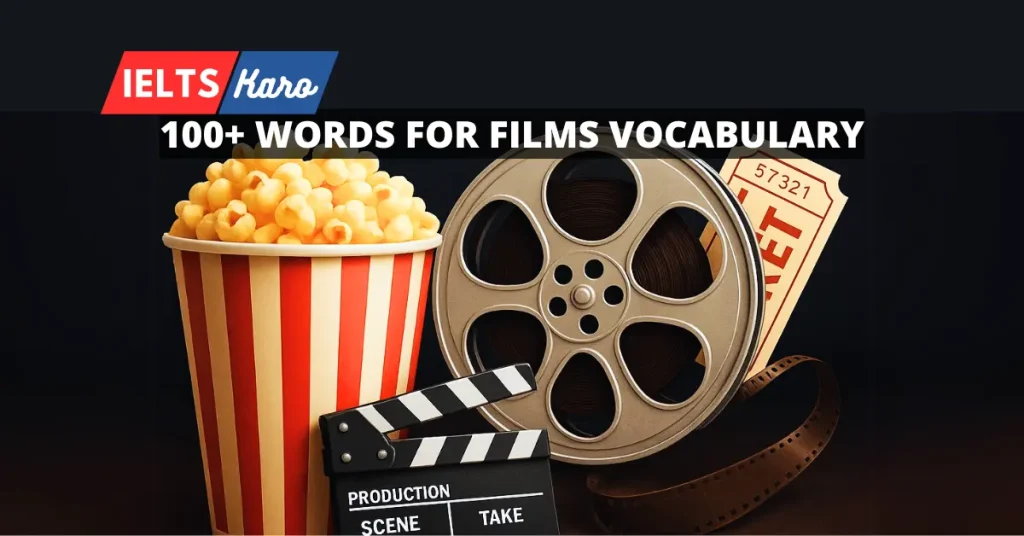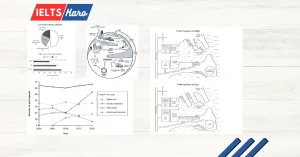Films Vocabulary for IELTS: The Ultimate Guide for Writing and Speaking Success
When was the last time you watched that movie in the theatre? How about the new season that just dropped on Netflix you plan on binge watching? Like me, I’m sure you must have enjoyed a movie or two recently.
And YOUR ability to discuss films and cinema intelligently is not just a social skill but an essential component for IELTS success. The IELTS examination frequently features questions related to entertainment, media, and films in both the Writing and Speaking modules. Boost your lexical resource and fluency by using the most and least commonly used films vocabulary words in writing and speaking. This comprehensive guide will equip you with the terminology, phrases, and expressions needed to excel in film-related IELTS tasks.
Let’s Go.
Essential Films Vocabulary for Film Genre
Understanding genre-specific vocabulary allows you to categorize and discuss different types of films accurately.
| Genre | Definition | Example Sentence |
|---|---|---|
| Action | Films with lots of excitement, danger, and physical stunts | “The latest Mission Impossible installment is a high-octane action film with breathtaking stunts and explosive sequences.” |
| Comedy | Humorous films | “The slapstick comedy had the audience in stitches from beginning to end.” |
| Drama | Films that focus on emotional development of characters | “The compelling drama explored complex family relationships with nuanced performances.” |
| Thriller | Films with suspense, tension, and excitement | “Hitchcock’s psychological thrillers keep viewers on the edge of their seats through masterful suspense-building techniques.” |
| Horror | Films designed to induce fear | “The spine-chilling horror film employed jump scares that terrified the audience.” |
| Romance | Films focusing on love stories and relationships | “The heartwarming romantic comedy portrayed the ups and downs of modern relationships.” |
| Science fiction | Films based on speculative scientific discoveries or technologies | “The thought-provoking sci-fi film examined the ethical implications of artificial intelligence.” |
| Documentary | Non-fictional films presenting facts and information | “The eye-opening documentary shed light on environmental issues affecting marine ecosystems.” |
| Animation | Films created using various animation techniques | “The visually stunning animated feature appealed to audiences of all ages with its universal themes.” |
| Historical | Films set in the past, often depicting real events | “The meticulously researched historical drama brought ancient Rome to life with remarkable accuracy.” |
Less Common Genre Terms to Impress IELTS Examiners:
- Film noir: Dark films typically depicting crime and moral ambiguity
- Neo-noir: Modern films incorporating elements of traditional film noir
- Mockumentary: Fictional film presented as a documentary for comedic or satirical effect
- Dystopian: Films depicting an end of the world state with great suffering
- Biographical picture (biopic): Films dramatizing the life of a real person
Film Production Terminology
Understanding the filmmaking process demonstrates sophisticated knowledge about the industry.
| Term | Definition | Example Sentence |
|---|---|---|
| Director | Person who controls the artistic aspects of a film | “The visionary director is known for his distinctive visual style and meticulous attention to detail.” |
| Screenplay | Written text containing dialogue and directions for a film | “The well-crafted screenplay seamlessly blended comedy and drama.” |
| Cinematography | Art of photography and visual storytelling in films | “The film won an Oscar for its stunning cinematography that captured the rugged landscape beautifully.” |
| Editing | Process of selecting and arranging film shots | “The tight editing maintained a brisk pace throughout the action sequences.” |
| Sound design | Process of specifying, acquiring, manipulating sound elements | “The film’s immersive sound design transported viewers into the heart of the battlefield.” |
| Special effects (SFX) | Illusions created for films | “The groundbreaking special effects made the fantastical creatures appear remarkably lifelike.” |
| Visual effects (VFX) | Imagery created or manipulated outside the context of a live action shot | “The seamless visual effects transformed ordinary locations into alien landscapes.” |
| Casting | Process of selecting actors for roles | “The inspired casting of relatively unknown actors lent authenticity to the indie film.” |
| Production design | Creation of visual appearance of a film | “The meticulous production design accurately recreated 1950s America down to the smallest details.” |
| Costume design | Creation of clothing and attire for characters | “The elaborate costume design highlighted the social status of different characters in the period drama.” |
Discussing Film Narratives
These terms help you analyze storylines and character development.
Example: “The film’s non-linear narrative used frequent flashbacks to gradually reveal the protagonist’s motivations, while subtle foreshadowing prepared viewers for the shocking plot twist in the final act.”
Character Development:
- Protagonist: Main character
- Antagonist: Character who opposes the protagonist
- Character arc: Evolution of a character throughout the story
- Dynamic character: Character who changes significantly
- Static character: Character who remains essentially unchanged
- Anti-hero: Protagonist lacking conventional heroic attributes
- Foil character: Character who contrasts with another
- Ensemble cast: Group of actors with roughly equal importance
Example: “The film featured a morally ambiguous anti-hero whose compelling character arc transformed him from a self-centered individual to someone willing to sacrifice everything for others.”
Expressing Opinions About Films
Having a range of expressions to convey your film assessments shows sophisticated language use.
Positive Expressions:
- Masterpiece: Work of outstanding artistry
- Groundbreaking: Innovative and pioneering
- Thought-provoking: Stimulating serious thought
- Captivating: Holding attention strongly
- Compelling: Evoking interest in a powerful way
- Nuanced: Showing subtle differences in portrayal
- Riveting: Completely engrossing
- Poignant: Evoking a keen sense of sadness or regret
- Visually stunning: Having exceptional visual quality
Example: “Parasite is a cinematic masterpiece that offers a thought-provoking commentary on social inequality through its nuanced character portrayals and visually stunning composition.”
Negative Expressions:
- Clichéd: Using overly familiar ideas lacking originality
- Melodramatic: Exaggeratedly emotional or sentimental
- Pretentious: Attempting to impress by affecting importance
- Formulaic: Following a predictable or standardized pattern
- Heavy-handed: Lacking subtlety or finesse
- Underwhelming: Failing to impress or make an impact
- Derivative: Imitative of another work rather than original
- Incoherent: Lacking logical connection or clarity
- Far-fetched: Difficult to believe, implausible
Example: “Despite its talented cast, the film was ultimately underwhelming due to its contrived plot and formulaic approach to the genre.”
Neutral/Balanced Expressions:
- Unconventional: Not based on traditional styles
- Ambitious: Showing high aspirations but not necessarily successful
- Polarizing: Creating sharply divided opinions
- Genre-defying: Not fitting easily into a single category
- Experimental: Using new and untested techniques
- Cult classic: Not widely popular but with dedicated fans
- Mixed reception: Receiving both positive and negative reviews
- Niche appeal: Appealing to a specialized audience
Example: “Darren Aronofsky’s polarizing film received mixed reception from critics, with some praising its unconventional storytelling while others found it overly abstract.”
Film Industry Vocabulary
Knowledge of the business aspects of filmmaking demonstrates a deeper understanding of cinema.
| Term | Definition | Example Sentence |
|---|---|---|
| Box office | Commercial success of a film measured by ticket sales | “The Marvel film was a box office smash, grossing over $1 billion worldwide.” |
| Blockbuster | Highly successful commercial film | “The summer blockbuster featured spectacular visual effects and an all-star cast.” |
| Independent film (indie) | Film produced outside major film studios | “The low-budget indie film surprised everyone by winning the top prize at Sundance.” |
| Film festival | Organized presentation of films in one or more cinemas | “The documentary premiered at the prestigious Cannes Film Festival to critical acclaim.” |
| Adaptation | Film based on another work like a book or play | “The faithful adaptation captured the essence of the beloved novel.” |
| Franchise | Series of related films, merchandise, etc. | “The profitable film franchise has spawned eight sequels and countless merchandise items.” |
| Reboot | New version of an established film series | “The successful reboot reintroduced the classic character to a new generation.” |
| Sequel | Film that continues the story of a previous film | “The highly anticipated sequel expanded on the world-building of the original.” |
| Prequel | Film that tells the story of events before a previous film | “The revealing prequel explored the villain’s tragic backstory.” |
| Distribution | Process of making a film available to the public | “The streaming service acquired the exclusive distribution rights to the acclaimed foreign film.” |
Advanced Industry Terms:
- Limited release: Film shown in a small number of theaters
- Wide release: Film shown in many theaters simultaneously
- Sleeper hit: Film that becomes successful gradually and unexpectedly
- Arthouse cinema: Theater specializing in independent or foreign films
- Film noir: Style of filmmaking characterized by cynicism and moral ambiguity
- Method acting: Acting technique where actors fully immerse themselves in their characters
- CGI (Computer-Generated Imagery): Computer graphics used in visual effects
- Motion capture: Recording actions of human actors for animation
- Green screen: Filming technique for compositing two images together
Advanced Cinematic Terms
Using these sophisticated terms will demonstrate exceptional vocabulary range.
| Term | Definition | Example Sentence |
|---|---|---|
| Auteur | Director with a distinctive style and creative vision | “Auteur directors like Wes Anderson can be recognized by their unique visual style and recurring themes.” |
| Denouement | Final part where threads of the plot are drawn together | “The film’s satisfying denouement resolved all the narrative mysteries.” |
| Diegetic sound | Sound that has a source within the film’s world | “The diegetic sound of a radio playing in the background provided historical context.” |
| Non-diegetic sound | Sound without a source in the film’s world, like soundtrack | “The swelling non-diegetic orchestral score heightened the emotional impact of the reunion scene.” |
| Juxtaposition | Placing contrasting elements side by side | “The director used stark juxtaposition between the wealthy and poor neighborhoods to emphasize social inequality.” |
| Leitmotif | Recurring musical theme associated with character/idea | “The villain’s appearances were always accompanied by the same ominous leitmotif.” |
| Symbolism | Use of symbols to represent ideas or qualities | “The recurring image of birds served as powerful symbolism for the protagonist’s desire for freedom.” |
| Montage | Sequence of separate images edited together | “The fast-paced montage effectively compressed five years of the character’s life into two minutes of screen time.” |
| Pathetic fallacy | Attribution of human emotions to the environment | “The pathetic fallacy of the gathering storm mirrored the mounting tension between the characters.” |
| Fourth wall breaking | When characters acknowledge they are in a film | “The comedy used frequent fourth wall breaking to create a sense of complicity with the audience.” |
IELTS Speaking: Film Questions and Sample Answers
Part 1: Personal Questions
Question: Do you enjoy watching films?
“I’m an avid film lover and try to keep up with both mainstream releases and independent films. Last time I watched was about a week ago and it was a new series on Netflix, binge-watching it in just 5 hours.”
Question: What kind of films do you prefer?
“I like action movies and comedies such as Jackie Chan’s Rush Hour 1 and 2, and not to forget Mission Impossible.”
Part 2: Cue Card
Describe a film that made a strong impression on you. You should say:
- What the film was about
- When and where you saw it
- Who you watched it with And explain why it made such a strong impression on you.
Sample Response: “I’d like to talk about ‘Parasite,’ the South Korean film that made an indelible impression on me when I watched it at an arthouse cinema shortly after its Palme d’Or win at Cannes. I attended a late-night screening with two close friends who share my passion for international cinema.
The film masterfully portrays the stark wealth disparity in contemporary society through the interconnected lives of two families from opposite ends of the socioeconomic spectrum. What begins as a darkly humorous social satire gradually transforms into a gripping thriller with elements of horror, defying easy genre classification.
Bong Joon-ho’s exceptional direction and entertainment with social commentary was marvellous. More than just entertainment, ‘Parasite’ prompted meaningful discussions about social inequality and privilege among my friends and me, demonstrating cinema’s unique power to entertain while stimulating critical thought.”
Part 3: Follow-up Questions
Question: Do you think violence in films influences people’s behavior?
“This is a nuanced issue that researchers have debated for decades. While there’s some evidence suggesting that prolonged exposure to graphic violence in media might desensitize viewers, particularly impressionable adolescents, the relationship isn’t straightforwardly causal.”
Question: How have advances in technology changed filmmaking?
“Technological advancements have revolutionized virtually every aspect of cinematic production and distribution. Most visibly, CGI and visual effects have expanded creative possibilities, enabling filmmakers to visualize concepts that were previously impossible.
Beyond production, streaming technology has fundamentally altered distribution models, challenging the traditional theatrical window and enabling niche films to find global audiences.”
Practice Exercises
Vocabulary Application Exercise:
- Write a 150-word review of a film you recently watched, incorporating at least 10 specialized terms from this guide.
- Prepare answers to potential IELTS Speaking questions about films using vocabulary from different sections.
- Create a compare and contrast paragraph about two films from the same genre using appropriate terminology.
Sentence Transformation:
Transform these basic sentences into sophisticated ones using film vocabulary:
- Basic: “The movie was good with nice acting.” Advanced: “The critically acclaimed drama featured nuanced performances and masterful direction.”
- Basic: “The story was interesting and had a surprise ending.” Advanced: “The compelling narrative maintained suspense throughout before delivering an unexpected plot twist in its denouement.”
- Basic: “The camera work was very good.” Advanced: “The cinematography skillfully employed tracking shots and dramatic low-key lighting to enhance the film’s noir aesthetic.”
IELTS Writing Task 2 Practice:
Write an introduction and outline for this topic: “Some people believe that film censorship is necessary to protect children, while others think it restricts artistic freedom. Discuss both views and give your opinion.”
Conclusion
If you are a movie lover, now is the time to master films vocabulary for IELTS Writing and Speaking. I am sure you will enjoy it.





